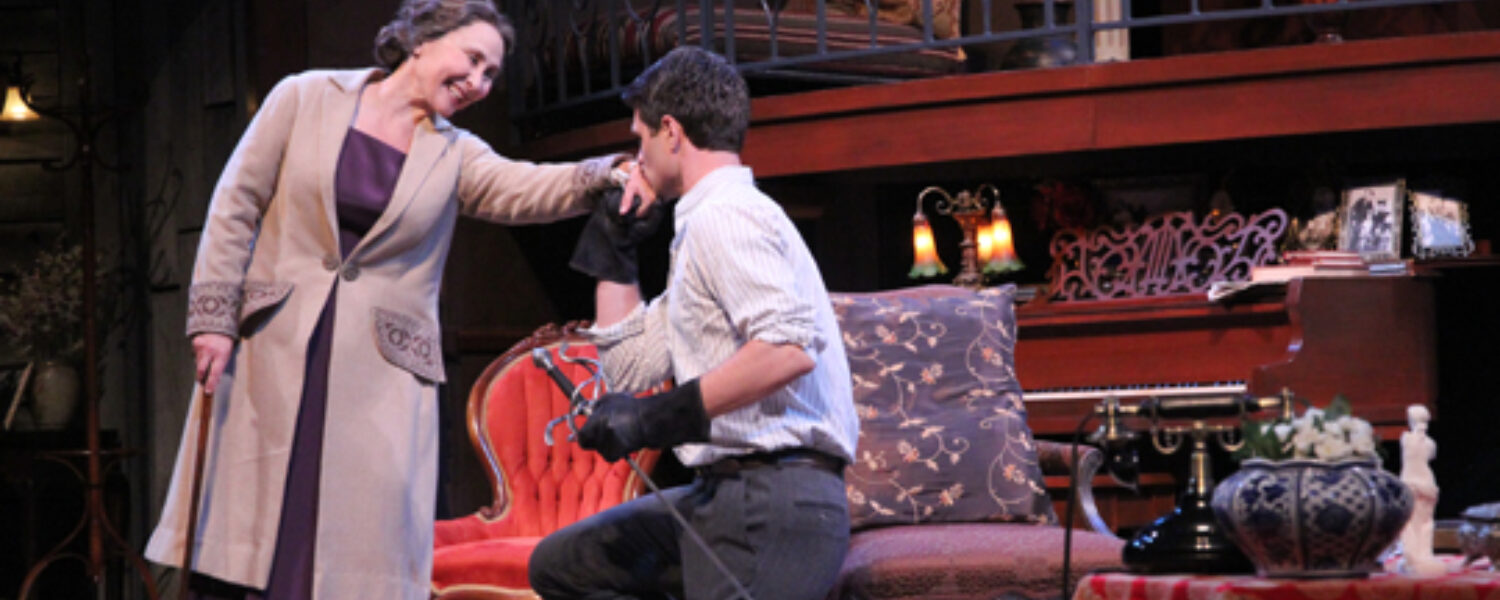
In this excerpt from APT's new podcast series, Orange Schroeder talks Royal Family with Laura Gordon and Sarah Day.
Orange Schroeder: This production is loosely based on the Barrymores, and Ethel Barrymore threatened a lawsuit after it debuted on Broadway. How closely does the play really follow the Barrymores and is it a loving tribute?
Laura Gordon: I do feel it's a loving tribute. And I would say it's quite loosely based on the Barrymores. I feel it's more of a spirit of an American theatrical family, and they were certainly in the public eye in that way. I think that the character of Tony resembles John Barrymore a lot more than the other characters resemble actual members of the family. But I find it a loving tribute. And I know that John Barrymore, when he saw a production of the play in LA with Frederick March playing Tony Cavendish, and John Barrymore thought it was hilarious and went backstage and congratulated Frederick March on his performance. Ethel Barrymore was a little more-upset with the play.
OS: Sarah, what can you tell us about Ethel Barrymore's reaction and her relationship with Edna Ferber?
Sarah Day: Well they had had a bit of a relationship, and each of them talk about it in their autobiography. But Ethel I think was very hurt by this play being produced, but she had great admiration for Edna Ferber's work. And just to make a plug, one thing that's really fun is that Edna Ferber is a Wisconsinite. She was raised in Appleton and worked on the Post-Crescent as a very young kid. So we have a little Wisconsin connection to this playwright, which makes me happy.
OS: What is it about this play that makes it worth producing?
LG: Well obviously it's beautifully written. Kaufman and Ferber are fantastic playwrights. But I think this play suits this company. I can't think of another theater in the country that is so equipped to produce a play like this. It's a family, a theatrical family, and to have a core company of actors that have worked together for so many years and already are a family, there's a whole, a trust, love, shorthand of the way that these guys work together, and if you had to direct a production where the entire cast was coming in from disparate places, and they were working together for the first time, I really don't think that you could get to where this cast is able to get. I'm sure there are other lovely productions of the play, but there's something inherently special about this particular group.
OS: What made you want to direct it?
LG: Upon first reading it, I was so struck by the strength of the female characters, and so struck by the matriarchal lines in this play, and I was so moved. It's very very funny, make no mistake. But I was so moved by the dilemmas of these women. Of actresses, of professionals, who are trying to juggle a personal life with a professional life. And I was also very moved by what the play brings up about Theatre, and about the importance of it and about the value of art.
OS: Speaking of matriarchs, Sarah, tell us a little bit about your role in the play and at APT.
SD: Well this is my 27th season at APT. And I arrived here when I was 27. So really, half my life has been here. And it's such a treat for me to be able to play the mother of a theatrical family, in a really loving way. I love the character that I'm playing. And I love that Jonathan Smoots is my brother. And I think he loves that he's my younger brother. And having Tracy as my daughter and having Marcus as my son, and Colleen as my sister in law, this could not be more joyous for me. This play is truly joyful.
OS: And which Barrymore is your character representing in the play?
SD: As Laura said, it's loosely based on the Barrymores. I think that Fanny Cavendish resembles, more than the actual mother of Ethel, John and Lionel, is there grandmother who was known as Mrs. John Drew, or as Lisa Lane. And she was an incredibly strong force within the American theatre. She was an actress manager, a business owner, and ran the Arch Street Theatre in Philadelphia for over 30 years. And did very well, it was considered one of the great theater companies outside of New York City. She was a wonderful force, and that's who I've used as a bit of a basis for Fanny.
Listen to the full podcast here.
